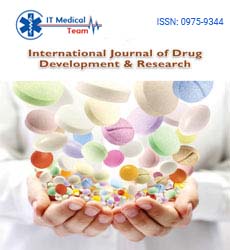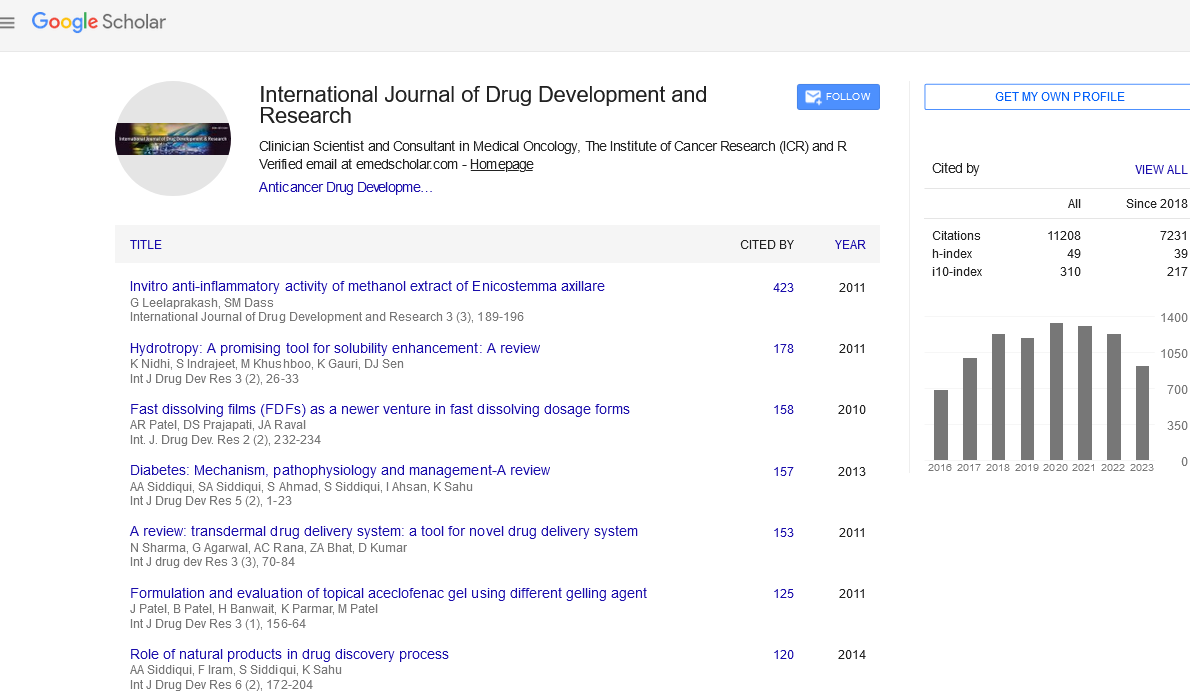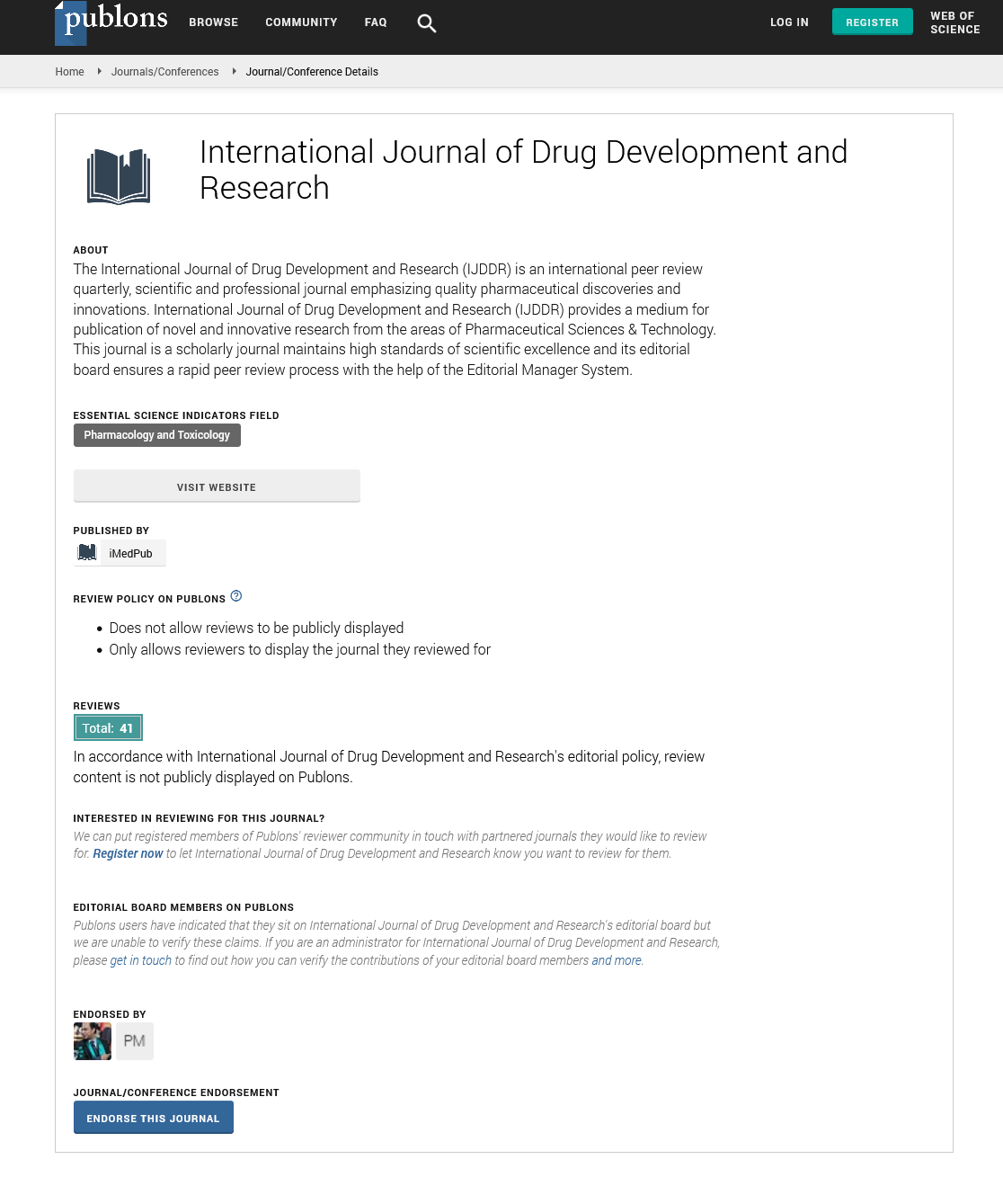Key words
|
| Aegle marmelos, medicinal plant, pharmacological activity. |
Introduction
|
| Due to the increasing awareness among the people towards natural products, natural medicine is attracting more attention than allopathic system. Since natural products obtained from trees have multiple medicinal properties, they attract major attention from indigenous communities of India Moreover this system of medicine is pollution free and less toxic without side effects. Out of the 6000 plants mentioned in the traditional systems of medicine, only 350 species are under use most of which are herbs. Aegle marmelos (L.) Corr., is one of them which plays a vital role in day to day usage [1]. Aegle marmelos (family: Rutaceae) is an important aromatic medicinal tree of Indian origin1-2. It is called by different names over different parts of India such as bilva, bel, sadaphal and shriphal [2]. It is used in the worship of Lord Shiva from historic times and hence commonly known as ‘Shivadurme’ [3-5], the tree of Shiva [6]. Tree is slow-growing and of medium size (12-15 m), generally cultivated in the vicinity of temple garden. It also vigorously grows in dry forest [6]. Almost every part of this tree viz. stems, barks, roots, leaves, flowers & fruits at all stages of maturity have medicinal virtues and have been used in various Ayurvedic medicines since long time [2] for the treatment of specific disorders such as respiratory disorders, constipation, ulcer, diarrhea, dysentery and many others [7]. It is also an important environmental protector as leaves and bark act as a sink by absorbing dust and foul and poisonous gases from surrounding atmosphere and makes them clean [7]. Owing to its environmentfriendly nature, Aegle marmelos is being placed among plant species group called “climate purifiers” which emit a greater percentage of oxygen in sunlight as compared to other plants [8]. Due to its endless uses, Aegle marmelos is also known as Mahaphala or Great fruit [9]. |
| Phytochemicals: It was shown that dry pulp of fruit contains mucilaginous mass. It was found that leaves, stem and root of this plant contains significant amount of tannins, alkaloids, coumarins and steroids. |
| (a) Alkaloids: Leaves mainly contain rutacine, ysitosterol, aegelemine and aegeline, marmeline, fragrine, dictamine, cinnamide and different derivatives of cinnamide [10-13]. |
| (b) Coumarins: Marmin, marmesin, umbelliferine, umbeliferone, skimmianine, Scoporone, scopoletin, psoralen, marmelide, xanthotoxol and impertonin were identified from the bark leaves, fruit and root of plant [10, 14]. |
 |
| (c) Seed oil: seed oil is bitter and contains 15.6% palmitic acid, 8.3% stearic acid, 28.7% linoleic and 7.6% linolenic acid while seed residue contains about 70% protein [10]. |
| (d) Polysaccharide: reducing sugars such as galactose, arabinose and L-rhamnose are found in fruit [15]. |
| Carotenoids are present in fruit and responsible for characteristics color of fruit. It was found that root of Aegle marmelos tree contain psoralin, xanthotoxin and scopolotein [16]. |
| General use: Different part of bael tree is used for various purposes. |
| (a) Wood: House building, cart construction, combs and different household’s articles [17, 18]. |
| (b) Leaf: Fodder, tooth brushes, chew sticks. |
| (c) Leaf juice: Added in bathing water to remove bad body smell [5]. |
| (d) Flower: Infusion of flower is used in cooling drinks. |
| (e) Stem gum: Used for adhesive and book binding [17, 18]. |
| (f) Fruit: A yellow dye obtained from rind of unripe fruit is used in printing. Fruit pulp is used for making “Sharbat”. Fruit pulp is added in water color paint to provide smoothness. Fruit pulps have detergent properties and so used in place of soap. Fruit pulp is pickled [18, 19]. Whole tree is used as wind barrier [20]. |
| Nutritional value: Different studies have shown that bael fruit has significant mineral and vitamin contents. It also contain moisture 64.2%, protein 1.8%, fat 0.2%, mineral 1.5%, fibre 2.2%, carbohydrate 31.8%, calcium 0.06%, phosphorous 0.05%, potassium 0.6%, vitamin C 0.01%, riboflavin 1.2%, nicotinic acid 0.9%, thiamin 0.01% and iron 0.3% per 100 gm [21, 22]. |
|
Pharmacological activity
|
| (1) Diarrhoea and dysentery: Generally dried fruit pulp and its powder are used for the treatment of diarrhoea. The dried powder is also used as an important remedy for chronic dysentery conditions characterized by alternate diarrhoea and constipation [23, 24]. It has been used for the treatment of amoebic dysentery. |
| (2) Antidiabetic activity: Leaf extract of the bael plant is generally known for their antidiabetic activity. It has been found that bael extract significantly reduces blood urea and cholesterol level in diabetic animals. It also decreases oxidative stress in diabetic animal. Leaf juice is directly employed in Unani system of medicine for antidiabetic activity [25-28]. Various studies as detailed below have signified its use as an antidiabetic agent. |
| Ismail et al. evaluated antidiabetic activity of Aegle marmelos leaf decoction and found that approximately five grams of leaf decoction administered orally once daily possess antidiabetic effect [29]. It was further proved by another study that aqueous leaf extract of Aegle marmelos have anti hypoglycemic activity, the results of which have shown that aqueous extract of the Aegle marmelos leaves were found to inhibit primarily the uptake of glucose across rat inverted gut sacs [30]. |
| Sabu et al. used methanolic leaf extract of Aegle marmelos to evaluate antioxidant and antidiabetic activity of plant material. Alloxan was used in this study to induce oxidative effect on pancreatic beta cells and further effect on glucose level. They found a significant decrease in lipid peroxidation, conjugated diene and hydroperoxide levels in serum as well as in liver induced by alloxan. It was predicted from the results obtained that the methanolic leaf extract of Aegle marmelos have characteristics to be used as hypoglycemic and antioxidant agent [31]. |
| Similarly, Sharma et al also studied both hypoglycemic and hypolipidemic effect of Aegle marmelos (L.) leaf extract on streptozocin induced diabetic mice. Initially, diabetic condition was introduced in mice using streptozocin (60 mg kg-1 body weight). Different evolutionary parameters were evaluated such as glucose tolerance test, lipid profile, glycogen biosynthesis, glucose uptake, differential regulation of glucose homeostatic enzymes like glucose-6-phosphatase, hexokinase and insulin release in vitro, for demonstrating the hypoglycemic and hypolipidemic effect in animal [32]. |
| (3) Antispermatogenic activity: It has been found that leaf extract has significant antispermatogenic activity. It inhibits the process of spermatogenesis and also reduces sperm motility [33]. Antifertility effect was also studied from aqueous extract of the leaves of Aegle marmelos on male albino rats. It was found that oral administration of this extract to male rats brought about a significant decrease in the weights of testes, epididymis, seminal vesicle, ventral prostate and vas deferens. From whole study it was finally concluded that aqueous extract of the leaves of Aegle marmelos has an antifertility effect [34]. |
| (4) Cardioprotective activity: Various studies have also reported the use of bael as a cardioprotective. The protective effect was estimated by administration of leaf extract in isoprenaline induced myocardial infarction in experimental animal [17, 18, 35, 36]. |
| (5) Anticancer activity: Studies showed that Indian bael (Aegle marmelos) extract posssess significant antiproliferative effect. It inhibits in vitro proliferation of human tumor cell lines including the leukemic K562 and Tlymphoid Jurhat [37]. |
| Kruawan et al compared antioxidant and antimutagenic activity of Carthamus tinctorius L., Hibiscus sabdariffa L., Chrysanthemum indicum L., Aegle marmelos L. and Jubliang. In this study they found that aqueous extracts are good sources of water soluble antioxidants, phenolic compounds and antimutagens [38]. |
| Vinodhini et al studied cytoprotective effect on common carp (Cyprinus carpio) exposed to heavy metals. Results confirmed the cytoprotective and antioxidant potential of Nelumbo nucifera and Aegle marmelos by stabilizating cell membrane and modulating antioxidant enzyme systems against stress induced by heavy metals [39]. |
| (6) Leucoderma: Psoralen present in the pulp of Aegle marmelos, increases tolerance of sunlight which aids in the maintenance of normal skin color and thus, it is employed in the treatment of leucoderma [40]. |
| (7) Anti asthmatic: Aegle marmelos leaf decoction is said to reduce phlegm in cold and alleviate asthma [40, 41]. In the traditional context of India, it is used in the management of asthma. A study conducted on guinea pig ileum and tracheal chain showed its antagonistic effect on the contractions produced by histamine. Thus it was concluded from the study that Aegle marmelos can be effectively used in the treatment of asthmatic disorders [42, 43]. |
| (8) Eye infections: The leaves of Aegle marmelos are considered an effective treatment for ophthalmia and various eye inflammations such as conjunctivitis. The decoction of its flowers is also used as eye lotion [40, 44, 45]. |
| (9) Snake bite antidote: The roots, leaves and barks of the plant are often used as an antidote in the treatment of snakebite [40, 46]. |
| (10) Febrifuge: Different parts of the plants are used in treating various types of fevers. For example, its bark decoction is administered in cases of malarial fever [40], leaf decoction is given in general fever, leaf paste is also used along with little honey in typhoid fever, etc [9, 44, 47, 48]. Studies have shown that bael extract can be used as febrifuge in night and for intermittent fever. |
| (11) Antiemetic: A decoction of the flowers and roots of Aegle marmelos is used as an antiemetic [49]. |
| (12) Haemostatic: The unripe fruit of the plant are used in the form of powder or paste as haemostatic [50]. |
| (13) Antipyretic and analgesic activity: In one study it was found that bael extract exhibits antipyretic, anti-inflammatory and analgesic activities in experimental animals [4, 7, 51]. |
| (14) Constipation: The riped bael fruit act as good laxative. It promotes peristaltic movements and thus helpful in the removal of fecal matter [52, 53]. |
| (15) Peptic ulcer: Bael fruit and leaf infusion has been used for the treatment of peptic ulcer. One of the important advantages of this fruit is that it forms a mucilaginous layer on the gastric mucosa and thus prevents interaction of acid with mucosal layer [54]. |
| (16) Antioxidant: Siddique et al. estimated the antioxidant activity of methanolic extract of leaves, root and stem bark of plant Aegle marmelos. In this study free radical scavenging activity of plant is estimated using DPPH (1, 1 -Diphenyl- 2 -picryl hydrazyl). Results showed that leaf extract have better antioxidant activity than stem bark and root extract [55]. Kamalakkannan et al. evaluated antioxidant activity of Aegle marmelos aqueous extract in streptozocin-induced diabetic rats. They used aqueous extract of bael fruit and activity was carried out in hepatic and renal tissues. Studies showed that activity of antioxidant enzymes such as superoxide dismutase, catalase and glutathione peroxidase was also found to be increased in the hepatic and renal tissues of diabetic animals [56]. |
| (17) Anti-inflammatory: Ghangale et al. evaluated anti-inflammatory activity of leaves extract of Aegle marmelos using rat as experimental animal and aspirin as standard drug. Results easily predicted the fact that leaf extract of this plant have sufficient antiinflammatory activity [57]. |
| (18) Antigenotoxic: Methanol and acetone extract of dried fruit were used to evaluate antigenotoxic activity of Aegle marmelos in Human Blood Lymphocytes and E. coli PQ [52]. It was found that both methanol extract and acetone extract were quite effective in decreasing the SOS response induced by hydrogen peroxide and aflatoxin B1 in the SOS chromotest [58]. |
| (19) Insect infestation: Rajesh Kumar et al. extracted essential oil from the leaves of Aegle marmelos and studied the effect of this oil on the insect infestation of stored gram from Callosobruchus chinensis and wheat from Rhyzopertha dominica, Sitophilus oryzae and Tribolium castaneum. Results showed that extracted leaf oil significantly reduced the grain damage as well as weight loss in fumigated gram and wheat samples infested with all insects except T. castaneum [59]. |
| (20) Anti microfilariae: Dahre et al. prepared methanolic extract of Aegle marmelos and further studied the antimicrofilariae effect using sterile plate. Results predicted the fact that methanolic extract of Aegle marmelos leaf have significant antimicrofilariae effect [60]. |
| (21) Hepatoprotective: Singanan et al. evaluated hepatoprotective effect of bael leaves in alcohol induced liver injury in albino rats. Obtained results indicated that the bael leaves have excellent hepatoprotective effect [61]. |
| (22) Antiburn and Radioprotective: Bael fruit powder mixed with mustard oil is used externally for the treatment of burn. It was found in various studies that due to free scavenging activity, bael fruits have radio protective effect on experimental animal. Its hydroalcoholic extract was evaluated in cultured human peripheral blood lymphocytes (HPBLs) by the micronucleus assay. Different doses of Aegle marmelos reduced the frequency of radiationinduced micronuclei significantly. However, the greatest reduction in micronucleus induction was observed with 5μg/ml. Therefore, this dose was considered as the optimum dose for radioprotection and further studies were carried out treating the HPBLs with the same dose before exposure to different doses of gamma-radiation. The study demonstrated that Aegle marmelos in 5 μg/ml protected HPBLs against radiation-induced DNA damage and genomic instability. This radioprotective activity may be by scavenging of radiation-induced free radicals and increased oxidant status [62]. |
| (23) Ear Problems: The root of this tree possesses astringent activity and is used as a home remedy for curing ear problems. Its root dipped in neem oil was lighted and the oil dripped out from the burning end is an effective medicine for ear problems. The astringent extract of the roots of Aegle marmelos combined with the antiseptic properties of neem helps in curing ear infection, chronic inflammation and pus discharge. The juice of leaves processed in oil is also used as ear drops to treat ear infection [63]. |
| (24) Antiepileptic: The leaves of Aegle marmelos was found to have antiepileptic activity in combination with Cassia fistula, Lagerstroemia reginae, Premna mucronata, whole plants of Solanum xanthocarpum, Tribulus terrestris, Desmodium gangeticum, Desmodium pulchellum and branches and leaves of Solanum indicum. The boiled paste of all these plants in water when administered orally with honey showed significant efficacy in the treatment of epilepsy [62]. |
| (25) Antileprotic: The powdered and sundried leaves of Aegle marmelos when sprinkled on the wound after taking bath proved to be an effective remedy for the treatment of leprosy [62]. |
| (26) Myalgia: The paste of ground roots of Aegle marmelos with cold water taken early morning in empty stomach helped in curing myalgia [62]. |
| (27) Smallpox: The paste of powdered leaves of Aegle marmelos is effectively used in the treatment of smallpox [62]. |
| (28) Antifungal: The unsaponifiable matter from the oil obtained from the seeds of Aegle marmelos was effective as antifungal agent [64-66]. The antifungal activity of essential oil isolated from leaves of bael plant was evaluated using spore germination assay and was found to possess variable efficacy against different fungal isolates. It also showed 100% inhibition of spore germination of all the fungi tested at 500 ppm [47, 67]. |
| The ethanolic extract of the plant was also found to be effective against Curvularia lunata, Aspergillus niger, and Rhizopus nodulans [68]. From one study the leaf extract of Aegle marmelos exhibited 100% fungal toxicity against Rhizoctonia solani [69]. |
| (29) Antibacterial: It was found that the fixed oil from seeds of Aegle marmelos and its unsaponifiable portion were found to be active against various strains of gram positive and gram negative bacteria [4]. |
| (30) Antidandruff: The rind of the fruit of bael is used in the treatment of dandruff. The processing of rind in either coconut oil or ginger oil also treats excess hair fall and scaly skin of the scalp. |
| (31) Kidney problems: The ground leaves of Aegle marmelos can be used to treat kidney problems [2]. |
| (32) Insomnia: It was found that the paste of ground roots of bael in butter was effective in the treatment of insomnia. When applied on the soles of the feet, it can induce sleep [2]. |
| (33) Gynaecological problems: The bark of bael root is effective in various gynaecological problems as proved by its famous ayurvedic formulation dashamoola (ten roots of medicinal plants) [8]. |
| (34) Antiallergic: Since its pulp has a detergent property, it can be used as herbal substitute of soaps, for allergic patients [8]. |
| (35) Antiarthritic: Raw bael fruit is used for treatment of arithritis and gout. Its pulp mixed with hot mustard oil can be applied on swollen joints for relief from these disorders [9]. |
| (36) Healthy mind and brain: The ripe fruit of Aegle marmelos keeps the body and mind cool, helps to sharpen intellect and concentration of mind. Thus, it is very effective in keeping healthy mind and brain [9]. |
| (37) Cure of Anaemia: Powdered pulp of bael consumed with boiled cow’s milk helps to cure anaemia [9]. |
| Marketed formulation of Aegle marmelos: Some of the marketed formulations of Aegle marmelos produced by different companies in tablets, capsules, syrups, etc. are listed in table 1. |
Conclusion
|
| From the several pharmacological activities narrated above, it is concluded that Aegle marmelos (Bael) is a plant of multiple medicinal properties. This plant has been used in traditional system of medicine for the treatment of various diseases. Studies easily predict the fact that whole plant of Aegle marmelos has sufficient medicinal value. |
Conflict of Interest
|
| NIL |
Source of Support
|
| NONE |
Acknowledgement
|
| Authors are highly thanks full to NESCAIR New Delhi, to provide library facility for literature survey. |
| |
Tables at a glance
|
 |
| Table 1 |
|
| |







